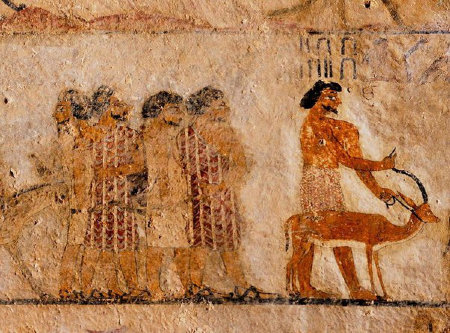 Hi readers, it seems you use Catholic Online a lot; that's great! It's a little awkward to ask, but we need your help. If you have already donated, we sincerely thank you. We're not salespeople, but we depend on donations averaging $14.76 and fewer than 1% of readers give. If you donate just $5.00, the price of your coffee, Catholic Online School could keep thriving. Thank you. Help Now >
Hi readers, it seems you use Catholic Online a lot; that's great! It's a little awkward to ask, but we need your help. If you have already donated, we sincerely thank you. We're not salespeople, but we depend on donations averaging $14.76 and fewer than 1% of readers give. If you donate just $5.00, the price of your coffee, Catholic Online School could keep thriving. Thank you. Help Now >
Miracle
FREE Catholic Classes
(Latin miraculum , from mirari , "to wonder").
In general, a wonderful thing, the word being so used in classical Latin; in a specific sense, the Latin Vulgate designates by miracula wonders of a peculiar kind, expressed more clearly in the Greek text by the terms terata , dynameis , semeia , i.e., wonders performed by supernatural power as signs of some special mission or gift and explicitly ascribed to God.
These terms are used habitually in the New Testament and express the meaning of miraculum of the Vulgate. Thus St. Peter in his first sermon speaks of Christ as approved of God, dynamesin, kai terasin kai semeiois ( Acts 2:22 ) and St. Paul says that the signs of his Apostleship were wrought, semeiois te kai terasin kai dynamesin ( 2 Corinthians 12:12 ). Their united meaning is found in the term erga i.e., works, the word constantly employed in the Gospels to designate the miracles of Christ. The analysis of these terms therefore gives the nature and scope of the miracle.
I. NATURE
(1) The word terata literally means "wonders", in reference to feelings of amazement excited by their occurrence, hence effects produced in the material creation appealing to, and grasped by, the senses, usually by the sense of sight, at times by hearing, e.g., the baptism of Jesus, the conversion of St. Paul. Thus, though the works of Divine grace, such as the Sacramental Presence, are above the power of nature, and due to God alone, they may be called miraculous only in the wide meaning of the term, i.e., as supernatural effects, but they are not miracles in the sense here understood, for miracles in the strict sense are apparent. The miracle falls under the grasp of the senses, either in the work itself (e.g. raising the dead to life ) or in its effects (e.g., the gifts of infused knowledge with the Apostles ). In like manner the justification of a soul in itself is miraculous, but is not a miracle properly so called, unless it takes place in a sensible manner, as, e.g., in the case of St. Paul .
The wonder of the miracle is due to the fact that its cause is hidden, and an effect is expected other than what actually takes place. Hence, by comparison with the ordinary course of things, the miracle is called extraordinary. In analyzing the difference between the extraordinary character of the miracle and the ordinary course of nature, the Fathers of the Church and theologians employ the terms above, contrary to , and outside nature. These terms express the manner in which the miracle is extraordinary.
A miracle is said to be above nature when the effect produced is above the native powers and forces in creatures of which the known laws of nature are the expression, as raising a dead man to life, e.g., Lazarus ( John 11 ), the widow's son ( 1 Kings 17 ). A miracle is said to be outside, or beside, nature when natural forces may have the power to produce the effect, at least in part, but could not of themselves alone have produced it in the way it was actually brought about. Thus the effect in abundance far exceeds the power of natural forces, or it takes place instantaneously without the means or processes which nature employs. In illustration we have the multiplication of loaves by Jesus ( John 6 ), the changing of water into wine at Cana ( John 2 ) -- for the moisture of the air by natural and artificial processes is changed into wine -- or the sudden healing of a large extent of diseased tissue by a draught of water. A miracle is said to be contrary to nature when the effect produced is contrary to the natural course of things.
The term miracle here implies the direct opposition of the effect actually produced to the natural causes at work, and its imperfect understanding has given rise to much confusion in modern thought. Thus Spinoza calls a miracle a violation of the order of nature ( proeverti , "Tract. Theol. Polit.", vi). Hume says it is a "violation" or an "infraction", and many writers -- e.g., Martensen, Hodge, Baden-Powell, Theodore Parker -- use the term for miracles as a whole. But every miracle is not of necessity contrary to nature, for there are miracles above or outside nature.
Again, the term contrary to nature does not mean "unnatural" in the sense of producing discord and confusion. The forces of nature differ in power and are in constant interaction. This produces interferences and counteractions of forces. This is true of mechanical, chemical, and biological forces. So, also, at every moment of the day I interfere with and counteract natural forces about me. I study the properties of natural forces with a view to obtain conscious control by intelligent counteractions of one force against another. Intelligent counteraction marks progress in chemistry, in physics -- e.g., steam locomotion, aviation -- and in the prescriptions of the physician. Man controls nature, nay, can live only by the counteraction of natural forces. Though all this goes on around us, we never speak of natural forces violated. These forces are still working after their kind, and no force is destroyed, nor is any law broken, nor does confusion result. The introduction of human will may bring about a displacement of the physical forces, but no infraction of physical processes.
Now in a miracle God's action relative to its bearing on natural forces is analogous to the action of human personality. Thus, e.g., it is against the nature of iron to float, but the action of Eliseus in raising the axe-head to the surface of the water ( 2 Kings 6 ) is no more a violation, or a transgression, or an infraction of natural laws than if he raised it with his hand. Again, it is of the nature of fire to burn, but when, e.g., the Three Children were preserved untouched in the fiery furnace ( Daniel 3 ) there was nothing unnatural in the act, as these writers use the word, any more than there would be in erecting a dwelling absolutely fireproof. In the one case, as in the other, there was no paralysis of natural forces and no consequent disorder.
The extraordinary element in the miracle -- i.e. an event apart from the ordinary course of things; enables us to understand the teaching of theologians that events which ordinarily take place in the natural or supernatural course of Divine Providence are not miracles, although they are beyond the efficiency of natural forces. Thus, e.g., the creation of the soul is not a miracle, for it takes place in the ordinary course of nature. Again, the justification of the sinner, the Eucharistic Presence, the sacramental effects, are not miracles for two reasons: they are beyond the grasp of the senses and they have place in the ordinary course of God's supernatural Providence.
(2) The word dynamis , "power" is used in the New Testament to signify:
- the power of working miracles, ( en dymamei semeion -- Romans 15:19 );
- mighty works as the effects of this power, i.e., miracles themselves ( al pleistai dynameis autou -- Matthew 11:20 ) and expresses the efficient cause of the miracle, i.e., Divine power.
An event is above the course of nature and beyond its productive powers:
- with regard to its substantial nature, i.e., when the effect is of such a kind that no natural power could bring it to pass in any manner or form whatsoever, as e.g., the raising to life of the widow's son ( Luke 7 ), or the cure of the man born blind ( John 9 ). These miracles are called miracles as to substance ( quoad substantiam ).
- With regard to the manner in which the effect is produced i.e., where there may be forces in nature fitted and capable of producing the effect considered in itself, yet the effect is produced in a manner wholly different from the manner in which it should naturally be performed, i.e., instantaneously, by a word, e.g., the cure of the leper ( Luke 5 ). These are called miracles as to the manner of their production (quoad modum).
God's power is shown in the miracle:
- directly through His own immediate action or
- mediately through creatures as means or instruments.
In the latter case the effects must be ascribed to God, for He works in and through the instruments; "Ipso Deo in illis operante" (Augustine, "De Civit. Dei", X, xii). Hence God works miracles through the instrumentality
- of angels, e.g., the Three Children in the fiery furnace ( Daniel 3 ), the deliverance of St. Peter from prison ( Acts 12 );
- of men, e.g., Moses and Aaron ( Exodus 7 ), Elias ( 1 Kings 17 ), Eliseus ( 2 Kings 5 ), the Apostles ( Acts 2:43 ), St. Peter ( Acts 3:9 ), St. Paul ( Acts 19 ), the early Christians ( Galatians 3:5 ).
- In the Bible also, as in church history, we learn that animate things are instruments of Divine power, not because they have any excellence in themselves, but through a special relation to God. Thus we distinguish holy relics, e.g., the mantle of Elias ( 2 Kings 2 ), the body of Eliseus ( 2 Kings 13 ), the hem of Christ's garment ( Matthew 9 ), the handkerchiefs of St. Paul ( Acts 19:12 ); holy images, e.g., the brazen serpent ( Numbers 21 ) holy things, e.g., the Ark of the Covenant, the sacred vessels of the Temple ( Daniel 5 ); holy places, e.g., the Temple of Jerusalem ( 2 Chronicles 6:7 ), the waters of the Jordan ( 2 Kings 5 ), the Pool of Bethsaida ( John 5 ).
Hence the contention of some modern writers, that a miracle requires an immediate action of Divine power, is not true. It is sufficient that the miracle be due to the intervention of God, and its nature is revealed by the utter lack of proportion between the effect and what are called means or instruments.
The word semeion means "sign", an appeal to intelligence, and expresses the purpose or final cause of the miracle. A miracle is a factor in the Providence of God over men. Hence the glory of God and the good of men are the primary or supreme ends of every miracle. This is clearly expressed by Christ in the raising of Lazarus ( John 11 ), and the Evangelist says that Jesus, in working His first miracle at Cana, "manifested his glory " ( John 2:11 ). Therefore the miracle must be worthy the holiness, goodness, and justice of God, and conducive to the true good of men. Hence they are not performed by God to repair physical defects in His creation, nor are they intended to produce, nor do they produce, disorder or discord; do they contain any element which is wicked, ridiculous, useless, or unmeaning. Hence they are not on the same plane with mere wonders, tricks works of ingenuity, or magic. The efficacy, usefulness, purpose of the work and the manner of performing it clearly show that it must be ascribed to Divine power. This high standing and dignity of the miracle is shown, e.g., in the miracles of Moses ( Exodus 7 - 10 ), of Elias ( 1 Kings 18:21-38 ), of Eliseus ( 2 Kings 5 ). The multitudes glorified God at the cure of the paralytic ( Matthew 9:8 ), of the blind man ( Luke 18:43 ), at the miracles of Christ in general ( Matthew 15:31 , Luke 19:37 ), as at the cure of the lame man by St. Peter ( Acts 4:21 ). Hence miracles are signs of the supernatural world and our connection with it.
In miracles we can always distinguish secondary ends, subordinate, however, to the primary ends. Thus
- they are evidences attesting and confirming the truth of a Divine mission, or of a doctrine of faith or morals, e.g., Moses ( Exodus 4 ), Elias ( 1 Kings 17:24 ). For this reason the Jews see in Christ "the prophet " ( John 6:14 ), in whom " God hath visited his people" ( Luke 7:16 ). Hence the disciples believed in Him ( John 2:11 ) and Nicodemus ( John 3:2 ) and the man born blind ( John 9:38 ), and the many who had seen the raising of Lazarus ( John 11:45 ). Jesus constantly appealed to His "works" to prove that He was sent by God and that He is the Son of God, e.g., to the Disciples of John ( Matthew 11:4 ), to the Jews ( John 10:37 ). He claims that His miracles are a greater testimony than the testimony of John ( John 5:36 ), condemns those who will not believe ( John 15:24 ), as He praises those who do ( John 17:8 ), and exhibits miracles as the signs of the True Faith ( Mark 16:17 ). The Apostles appeal to miracles as the confirmation of Christ's Divinity and mission ( John 20:31 ; Acts 10:38 ), and St. Paul counts them as the signs of his Apostleship ( 2 Corinthians 12:12 ).
- Miracles are wrought to attest true sanctity. Thus, e.g., God defends Moses ( Numbers 12 ), Elias ( 2 Kings 1 ), Eliseus ( 2 Kings 13 ). Hence the testimony of the man born blind ( John 9:30 sqq. ) and the official processes in the canonization of saints.
- As benefits either spiritual or temporal. The temporal favours are always subordinate to spiritual ends, for they are a reward or a pledge of virtue, e.g. the widow of Sarephta ( 1 Kings 17 ), the Three Children in the fiery furnace ( Daniel 3 ), the preservation of Daniel ( Daniel 5 ), the deliverance of St. Peter from prison ( Acts 12 ), of St. Paul from shipwreck ( Acts 27 ). Thus semeion , i.e., "sign", completes the meaning of dynamis , i.e., "[Divine] power". It reveals the miracle as an act of God's supernatural Providence over men. It gives a positive content to teras , i.e., "wonder", for, whereas the wonder shows the miracle as a deviation from the ordinary course of nature, the sign gives the purpose of the deviation.
This analysis shows that
- the miracle is essentially an appeal to knowledge. Therefore miracles can be distinguished from purely natural occurrences. A miracle is a fact in material creation, and falls under the observation of the senses or comes to us through testimony, like any natural fact. Its miraculous character is known:
- from positive knowledge of natural forces, e.g., the law of gravity, the law that fire burns. To say that we do not know all the laws of nature, and therefore cannot know a miracle (Rousseau, "Lett. de la Mont.", let. iii), is beside the question, for it would make the miracle an appeal to ignorance. I may not know all the laws of the penal code, but I can know with certainty that in a particular instance a person violates one definite law.
- From our positive knowledge of the limits of natural forces. Thus, e.g., we may not know the strength of a man, but we do know that he cannot by himself move a mountain. In enlarging our knowledge of natural forces, the progress of science has curtailed their sphere and defined their limits, as in the law of abiogenesis. Hence, as soon as we have reason to suspect that any event, however uncommon or rare it appear, may arise from natural causes or be conformable to the usual course of nature, we immediately lose the conviction of its being a miracle. A miracle is a manifestation of God's power; so long as this is not clear, we hould reject it as such.
- Miracles are signs of God's Providence over men, hence they are of high moral character, simple and obvious in the forces at work, in the circumstances of their working, and in their aim and purpose. Now philosophy indicates the possibility, and Revelation teaches the fact, that spiritual beings, both good and bad, exist, and possess greater power than man possesses. Apart from the speculative question as to the native power of these beings, we are certain
- that God alone can perform those effects which are called substantial miracles, e.g., raising the dead to life,
- that miracles performed by the angels, as recorded in the Bible , are always ascribed to God, and Holy Scripture gives Divine authority to no miracles less than Divine;
- that Holy Scripture shows the power of evil spirits as strictly conditioned, e.g., testimony of the Egyptian magicians ( Exodus 8:19 ), the story of Job, evil spirits acknowledging the power of Christ ( Matthew 8:31 ), the express testimony of Christ himself ( Matthew 24:24 ) and of the Apocalypse ( Revelation 9:14 ). Granting that these spirits may perform prodigies -- i.e., works of skill and ingenuity which, relatively to our powers, may seem to be miraculous -- yet these works lack the meaning and purpose which would stamp them as the language of God to men.
II. ERRORS
Deists reject miracles, for they deny the Providence of God. Agnostics also, and Positivists reject them: Comte regarded miracles as the fruit of the theological imagination. Modern Pantheism has no place for miracles. Thus Spinoza held creation to be the aspect of the one substance, i.e., God, and, as he taught that miracles were a violation of nature, they would therefore be a violation of God. The answer is, first that Spinoza's conception of God and nature is false and, secondly, that in fact miracles are not a violation of nature. To Hegel creation is the evolutive manifestation of the one Absolute Idea, i.e., God, and to the neo-Hegelians (e.g., Thos. Green) consciousness is identified with God ; therefore to both a miracle has no meaning.
Erroneous definitions of the supernatural lead to erroneous definitions of the miracle. Thus
- Bushnell defines the natural to be what is necessary, the supernatural to be what is free; therefore the material world is what we call nature, the world of man's life is supernatural. So also Dr. Strong ("Baptist Rev.", vol. I, 1879), Rev. C.A. Row ("Supernat. in the New Test.", London, 1875). In this sense every free volition of man is a supernatural act and a miracle.
- The natural supernaturalism proposed by Carlyle, Theodore Parker, Prof. Pfleiderer, and, more recently, Prof. Everett ("The Psychologic Elem. of Relig. Faith", London and New York, 1902), Prof. Bowne ("Immanence of God", Boston and New York, 1905), Hastings ("Diction. of Christ and the Gospels", s.v. "Miracles"). Thus the natural and the supernatural are in reality one: the natural is its aspect to man, the supernatural is its aspect to God.
- The "Immediate theory", that God acts immediately without second causes, or that second causes, or laws of nature, must be defined as the regular methods of God's acting. This teaching is combined with the doctrine of evolution.
- The "relative" theory of miracles is by far the most popular with non-Catholic writers. This view was originally proposed to hold Christian miracles and at the same time hold belief in the uniformity of nature. Its main forms are three.
In Babbage's view, which was later advanced by the Duke of Argyll (Reign of Law), nature is presented as a vast mechanism wound up in the beginning and containing in itself the capacity to deviate at stated times from its ordinary course. The theory is ingenious, but it makes the miracle a natural event. It admits the assumption of opponents of miracles, viz., that physical effects must have physical causes, but this assumption is contradicted by common facts of experience, e.g., will acts on matter.
(2) The "unknown" law of SpinozaSpinoza taught that the term miracle should be understood with reference to the opinions of men, and that it means simply an event which we are unable to explain by other events familiar to our experience. Locke, Kant, Eichhorn, Paulus Renan hold the same view. Thus Prof. Cooper writes "The miracle of one age becomes the ordinary working of nature in the next" ("Ref. Ch. R.", July, 1900). Hence a miracle never happened in fact, and is only a name to cover our ignorance. Thus Matthew Arnold could claim that all Biblical miracles will disappear with the progress of science (Lit. and Bible) and M. Muller that "the miraculous is reduced to mere seeming" (in Rel., pref., p. 10). The advocates of this theory assume that miracles are an appeal to ignorance.
(3) The "higher law" theory of Argyll of "Unseen Universe"Trench, Lange (on Matt., p. 153), Gore (Bampton Lect, p. 36) proposed to refute Spinoza's claim that miracles are unnatural and productive of disorder. Thus with them the miracle is quite natural because it takes place in accordance with laws of a higher nature. Others -- e.g., Schleiermacher and Ritschl -- mean by higher law, subjective religious feeling. Thus, to them a miracle is not different from any other natural event; it becomes a miracle by relation to the religious feeling. A writer in "The Biblical World" (Oct., 1908) holds that the miracle consists in the religious significance of the natural event in its relation to the religious appreciation as a sign of Divine favour. Others explain higher law as a moral law, or law of the spirit. Thus the miracles of Christ are understood as illustrations of a higher, grander, more comprehensive law than men had yet known, the incoming of a new life, of higher forces acting according to higher laws as manifestations of the spirit in the higher stages of its development. The criticism of this theory is that miracles would cease to be miracles: they would not be extraordinary, for they would take place under the same conditions. To bring miracles under a law not yet understood is to deny their existence. Thus, when Trench defines a miracle as "an extraordinary event which beholders can reduce to no law with which they are acquainted", the definition includes hypnotism and clairvoyance. If by higher law we mean the high law of God's holiness, then a miracle can be referred to this law, but the higher law in this case is God Himself and the use of the term is apt to create confusion.
III. ANTECEDENT IMPROBABILITY
The great problem of modern theology is the place and value of miracles. In the opinion of certain writers, their antecedent improbability, based on the universal reign of law is so great that they are not worthy of serious consideration. Thus his conviction of the uniformity of nature led Hume to deny testimony for miracles in general, as it led Baur, Strauss, and Renan to explain the miracles of Christ on natural grounds. The fundamental principle is that whatever happens is natural, and what is not natural does not happen. On belief in the uniformity of nature is based the profound conviction of the organic unity of the universe, a characteristic trait of nineteenth-century thought. It has dominated a certain school of literature, and, with George Eliot, Hall Came, and Thomas Hardy, the natural agencies of heredity, environment, and necessary law rule the world of human life. It is the basic principle in modern treatises on sociology.
Its chief exponent is science philosophy, a continuation of the Deism of the eighteenth century without the idea of God, and the view herein presented, of an evolving universe working out its own destiny under the rigid sway of inherent natural laws, finds but a thin disguise in the Pantheistic conception, so prevalent among non-Catholic theologians, of an immanent God, who is the active ground of the world-development according to natural law -- i.e., Monism of mind or will. This belief is the gulf between the old and the modern school of theology. Max Muller finds the kernel of the modern conception of the world in the idea that "there is a law and order in everything, and that an unbroken chain of causes and effects holds the whole universe together" ("Anthrop. Relig.", pref., p. 10). Throughout the universe there is a mechanism of nature and of human life, presenting a necessary chain, or sequence, of cause and effect, which is not, and cannot be, broken by an interference from without, as is assumed in the case of a miracle. This view is the ground of modern objections to Christianity, the source of modern scepticism, and the reason for a prevailing disposition among Christian thinkers to deny miracles a place in Christian evidences and to base the proof for Christianity on internal evidences alone.
Criticism(1) This view ultimately rests upon the assumption that the material universe alone exists. It is refuted:
- by proving that in man there is a spiritual soul totally distinct from organic and inorganic existence, and that this soul reveals an intellectual and moral order totally distinct from the physical order;
- by inferring the existence of God from the phenomena of the intellectual, the moral, and the physical order.
(2) This view is also based on an erroneous meaning of the term nature . Kant made a distinction between the noumenon and the phenomenon of a thing, he denied that we can know the noumenon , i.e., the thing in itself; all we know is the phenomenon , i.e., the appearance of the thing. This distinction has profoundly influenced modern thought. As a Transcendental Idealist, Kant denied that we know the real phenomenon; to him only the ideal appearance is the object of the mind. Thus knowledge is a succession of ideal appearances, and a miracle would be an interruption of that succession. Others, i.e., the Sense-School (Hume, Mill, Bain, Spencer, and others), teach that, while we cannot know the substance or essences of things, we can and do grasp the real phenomena. To them the world is a phenomenal world and is a pure coexistence and succession of phenomena, the antecedent determines the consequent. In this view a miracle would be an unexplained break in the (so-called) invariable law of sequence, on which law Mill based his Logic. Now we reply that the real meaning of the word nature includes both the phenomenon and the noumenon. We have the idea of substance with an objective content. In reality the progress of science consists in the observation of, and experimentation upon, things with a view to find out their properties or potencies, which in turn enable us to know the physical essences of the various substances.
(3) Through the erroneous conception of nature, the principle of causality is confounded with the law of the uniformity of nature. But they are absolutely different things. The former is a primary conviction which has its source in our inner consciousness. The latter is an induction based upon a long and careful observation of facts: it is not a self-evident truth, nor is it a universal and necessary principle, as Mill himself has shown (Logic, IV, xxi). In fact uniformity of nature is the result of the principle of causation.
(4) The main contention, that the uniformity of nature rules miracles out of consideration, because they would imply a break in the uniformity and a violation of natural law, is not true. The laws of nature are the observed modes or processes in which natural forces act. These forces are the properties or potencies of the essences of natural things. Our experience of causation is not the experience of a mere sequence but of a sequence due to the necessary operation of essences viewed as principles or sources of action.
Now essences are necessarily what they are and unchangeable, therefore their properties, or potencies, or forces, under given circumstances, act in the same way. On this, Scholastic philosophy bases the truth that nature is uniform in its action, yet holds that constancy of succession is not an absolute law for the succession is only constant so long as the noumenal relations remain the same. Thus Scholastic philosophy, in defending miracles, accepts the universal reign of law in this sense, and its teaching is in absolute accord with the methods actually pursued by modern science in scientific investigations. Hence it teaches the order of nature and the reign of law, and openly declares that, if there were no order, there would be no miracle.
It is significant that the Bibleappeals constantly to the reign of law in nature, while it attests the actual occurrence of miracles. Now human will, in acting on material forces, interferes with the regular sequences, but does not paralyze the natural forces or destroy their innate tendency to act in a uniform manner. Thus a boy, by throwing a stone into the air, does not disarrange the order of nature or do away with the law of gravity. A new force only is brought in and counteracts the tendencies of the natural forces, just as the natural forces interact and counteract among themselves, as is shown in the well-known truths of the parallelogram of forces and the distinction between kinetic and potential energy. The analogy from man's act to God's act is complete as far as concerns a break in the uniformity of nature or a violation of its laws. The extent of the power exerted does not affect the point at issue. Hence physical nature is presented as a system of physical causes producing uniform results, and yet permits the interposition of personal agency without affecting its stability.
(5) The truth of this position is so manifest that Mill admits Hume's argument against miracles to be valid only on the supposition that God does not exist for, he says, "a miracle is a new effect supposed to be produced by the introduction of a new cause . . . of the adequacy of that cause, if present, there can be no doubt " (Logic, III, xxv). Hence, admitting the existence of God , Hume's "uniform sequence" does not hold as an objection to miracles. Huxley also denies that physicists withhold belief in miracles because miracles are in violation of natural laws and he rejects the whole of this line of argument ("Some Controverted questions", 209; "Life of Hume", 132), and holds that a miracle is a question of evidence pure and simple. Hence the objection to miracles on the ground of their antecedent improbability has been abandoned. "The Biblical World" (Oct., 1908) says "The old rigid system of 'Laws of Nature' is being broken up by modern science. There are many events which scientists recognize to be inexplicable by any known law. But this inability to furnish a scientific explanation is no reason for denying the existence of any event, if it is adequately attested. Thus the old a priori argument against miracles is gone." Thus in modern thought the question of the miracle is simply a question of fact.
IV. PLACE AND VALUE OF MIRACLES IN THE CHRISTIAN VIEW OF THE WORLD
As the great objection to miracles really rests on narrow and false philosophical views of the universe, so the true world-view is necessary to grasp their place and value.
Christianity teaches that God created and governs the world. This government is His xxyyyk.htm">Providence. It is shown in the delicate adjustment and subordination of the tendencies proper to material things, resulting in the marvellous stability and harmony which prevail throughout the physical creation, and in the moral order, which through conscience, is to guide and control the tendencies of man's nature to a complete harmony in human life. Man is a personal being, with intelligence and free-will, capable of knowing and serving God, and created for that purpose. To him nature is the book of God's work revealing the Creator through the design visible in the material order and through conscience, the voice of the moral order based in the very constitution of his own being. Hence the relation of man to God is a personal one. God's Providence is not confined to the revelation of Himself through His works. He has manifested Himself in a supernatural manner throwing a flood of light on the relations which should exist between man and Himself. The Bible contains this revelation, and is called the Book of God's Word. It gives the record of God's supernatural Providence leading up to the Redemption and the founding of the Christian Church. Here we are told that beyond the sphere of nature there is another realm of existence -- the supernatural, peopled by spiritual beings and departed souls. Both spheres, the natural and the supernatural, are under the overruling Providence of God. Thus God and man are two great facts. The relation of the soul to its Maker is religion.
Religion is the knowledge, love, and service of God ; its expression is called worship, and the essence of worship is prayer. Thus between man and God there is constant intercourse, and in God's Providence the appointed means of this intercourse is prayer. By prayer man speaks to God in acts of faith, hope, love, and contrition and implores His aid. In answer to prayer God acts on the soul by His grace and, in special circumstances, by working miracles. Hence the great fact of prayer, as the connecting link of man to God, implies a constant interference of God in the life of man. Therefore in the Christian view of the world, miracles have a place and a meaning. They arise out of the personal relation between God and man. The conviction that the pure of heart are pleasing to God, in some mysterious way, is worldwide; even among the heathens pure offerings only are prepared for the sacrifice.
This intimate sense of God's presence may account for the universal tendency to refer all striking phenomena to supernatural causes. Error and exaggeration do not change the nature of the belief founded in the abiding conviction of the Providence of God . To this belief St. Paul appealed in his discourse to the Athenians ( Acts 17 ). In the miracle, therefore, God subordinates physical nature to a higher purpose, and this higher purpose is identical with the highest moral aims of existence. The mechanical view of the world is in harmony with the teleological, and when purpose exists, no event is isolated or unmeaning. Man is created for God, and a miracle is the proof and pledge of His supernatural xxyyyk.htm">Providence. Hence we can understand how, in devout minds, there is even a presumption for and an expectation of miracles. They show the subordination of the lower world to the higher, they are the breaking in of the higher world on the lower ("C. Gent.", III, xcviii, xcix; Benedict XIV, 1,c,1,IV,p. l.c.I).
Some writers -- e.g., Paley, Mansel, Mozley, Dr. George Fisher -- push the Christian view to the extreme, and say that miracles are necessary to attest revelation. Catholic theologians, however, take a broader view. They hold
- that the great primary ends of miracles are the manifestation of God's glory and the good of men; that the particular or secondary ends, subordinate to the former, are to confirm the truth of a mission or a doctrine of faith or morals, to attest the sanctity of God's servants, to confer benefits and vindicate Divine justice.
- Hence they teach that the attestation of Revelation is not the primary end of the miracle, but its main secondary end, though not the only one.
- They say that the miracles of Christ were not necessary but "most fitting and altogether in accord with His mission" ( decentissimum et maximopere conveniens ) -- Benedict XIV, IV, p. 1, c. 2, n. 3; ST III:43 ) as a means to attest its truth. At the same time they place miracles among the strongest and most certain evidences of Divine revelation.
- Yet they teach that, as evidences, miracles have not a physical force, i.e., absolutely compelling assent, but only a moral force, i.e. they do no violence to free will, though their appeal to the assent is of the strongest kind.
- That, as evidences, they are not wrought to show the internal truth of the doctrines, but only to give manifest reasons why we should accept the doctrines. Hence the distinction: not evidenter vera , but evidenter credibilia . For the Revelation, which miracles attest, contains supernatural doctrines above the comprehension of the mind and positive institutions in God's supernatural Providence over men. Thus the opinion of Locke, Trench, Mill, Mozley, and Cox, that the doctrine proves the miracle not the miracle the doctrine, is not true.
- Finally, they maintain that the miracles of Scripture and the power in the Church of working miracles are of Divine faith, not, however the miracles of church history themselves. Hence they teach that the former are both evidences of fa
Join the Movement
When you sign up below, you don't just join an email list - you're joining an entire movement for Free world class Catholic education.
-

-
Mysteries of the Rosary
-
St. Faustina Kowalska
-
Litany of the Blessed Virgin Mary
-
Saint of the Day for Wednesday, Oct 4th, 2023
-
Popular Saints
-
St. Francis of Assisi
-
Bible
-
Female / Women Saints
-
7 Morning Prayers you need to get your day started with God
-
Litany of the Blessed Virgin Mary
Biblical Lost Alphabet Traced Back to Ancient Canaanite Civilization
-

What are the Health Benefits of Grass-Fed Beef for Your Body and Mind?
-

Rise Above Poverty is Empowering Children and Families Through Education and Compassion
-
Artists and Leaders Rally to Preserve the Traditional Latin Mass
-
Republicans Demand Answers Over Army Training Slide Labeling Pro-Life Groups as Terrorist Threats
Daily Catholic
 Daily Readings for Wednesday, July 24, 2024
Daily Readings for Wednesday, July 24, 2024 St. John Boste: Saint of the Day for Wednesday, July 24, 2024
St. John Boste: Saint of the Day for Wednesday, July 24, 2024 Prayer for Travelers: Prayer of the Day for Wednesday, July 24, 2024
Prayer for Travelers: Prayer of the Day for Wednesday, July 24, 2024- Daily Readings for Tuesday, July 23, 2024
- St. Bridget of Sweden: Saint of the Day for Tuesday, July 23, 2024
- A Child's Prayer to Mary: Prayer of the Day for Tuesday, July 23, 2024
![]()
Copyright 2024 Catholic Online. All materials contained on this site, whether written, audible or visual are the exclusive property of Catholic Online and are protected under U.S. and International copyright laws, © Copyright 2024 Catholic Online. Any unauthorized use, without prior written consent of Catholic Online is strictly forbidden and prohibited.
Catholic Online is a Project of Your Catholic Voice Foundation, a Not-for-Profit Corporation. Your Catholic Voice Foundation has been granted a recognition of tax exemption under Section 501(c)(3) of the Internal Revenue Code. Federal Tax Identification Number: 81-0596847. Your gift is tax-deductible as allowed by law.
















 Daily Readings for Wednesday, July 24, 2024
Daily Readings for Wednesday, July 24, 2024 St. John Boste: Saint of the Day for Wednesday, July 24, 2024
St. John Boste: Saint of the Day for Wednesday, July 24, 2024 Prayer for Travelers: Prayer of the Day for Wednesday, July 24, 2024
Prayer for Travelers: Prayer of the Day for Wednesday, July 24, 2024